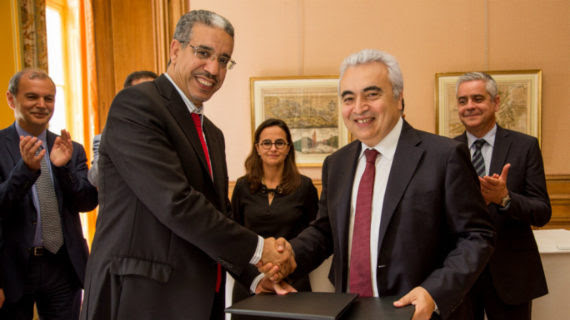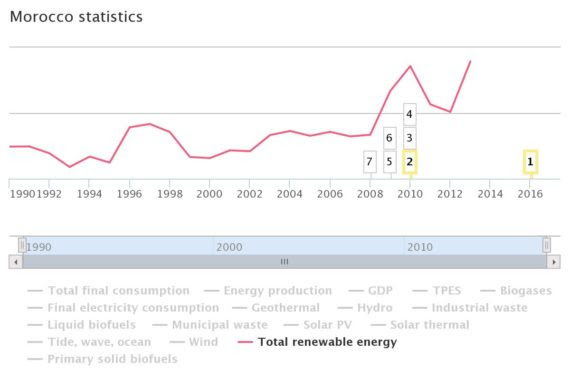Clean Technica
by Joshua S Hill
The Kingdom of Morocco has this week signed a three-year Joint Programme of Work with the International Energy Agency to help the country in its transition to a low-carbon economy, focusing on energy security, energy efficiency, and renewable energy.
The North African country known as the Kingdom of Morocco has only been an Association Country with the International Energy Agency (IEA) since last November, and this week the two signed a three-year Joint Programme of Work to deepen bilateral collaboration in the areas of security, energy efficiency, renewable energy, capacity building, and data and statistics. Specifically, the work program is aimed at helping speed a transition to a low-carbon economy based on Morocco’s particular needs. The program will see the IEA Secretariat and the Moroccan Ministry of Energy, Mines and Sustainable Development work to reach the Kingdom’s long-term energy targets.
“This Joint Programme of Work takes the long-standing relationship between the IEA and Morocco to a new level,” said Dr Fatih Birol, the IEA’s executive director, at the signing ceremony in Paris. “It will cement the partnership between the two parties for a more sustainable and secure energy future. Morocco’s leadership and commitment to expanding the deployment of renewable energy and weaning itself off imported fossil fuel are to be commended.”
His Excellency Aziz Rabbah, Morocco’s Minister of Energy, Mines and Sustainable Development, left, and Dr Fatih Birol, the IEA’s executive director. Photograph: ©IEA/Andrew Wheeler
We don’t necessarily hear a lot about Morocco, maybe because it is relatively small-fry in terms of its renewable energy capacity. The Kingdom of Morocco only has around 2 GW worth of renewable energy capacity, dominated by 1,265 MW of large-hydropower and 798 MW of onshore wind energy. In total, as of 2013, Morocco had 4,471 GWh of renewble electricity.
The Kingdom was nevertheless the first country in the Middle East and North Africa (often lumped together as the MENA region) to join the IEA’s Association initiative, which is aimed at opening its doors to emerging economies. Further, in 2009, Morocco set an impressive target of reaching 42% electricity generated from renewable energy sources by 2020. Additionally, Morocco implemented net metering legislation for solar PV and onshore wind plants, with private generators being allowed to sell up to 20% of their production.
Morocco has numerous renewable energy resources, including obviously wind and hydro-power, as well as large solar resources, and is already a regional leader in terms of deploying these clean technologies. The Kingdom is looking to reduce its reliance upon fossil fuel imports, while solving the gap by increasing renewable energy generation. Morocco was also one of the first MENA countries to cut fossil fuel subsidies and introduce energy efficiency measures — a step that even many western countries have failed to do.
Check out our new 93-page EV report.
Join us for an upcoming Cleantech Revolution Tour conference!








